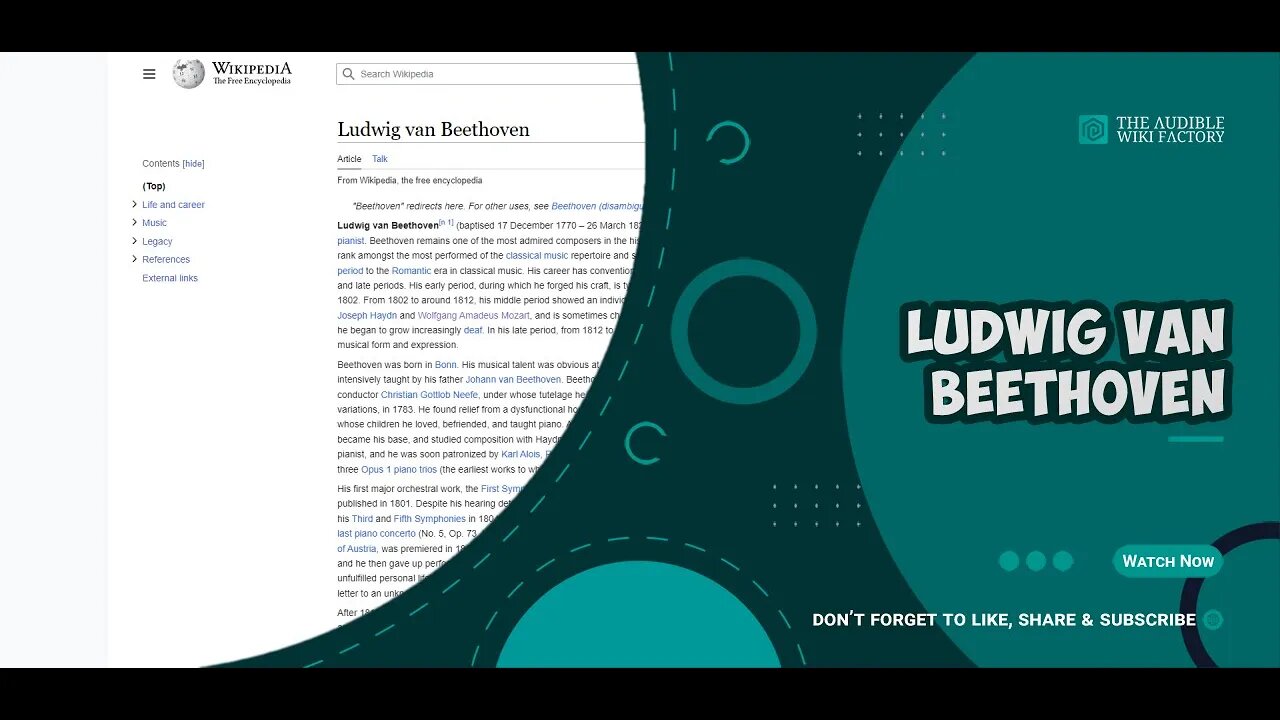Premium Only Content

Ludwig van Beethoven was a German composer and pianist. Beethoven remains one of the most
Ludwig van Beethoven was a German composer and pianist. Beethoven remains one of the most admired composers in the history of Western music; his works rank amongst the most performed of the classical music repertoire and span the transition from the Classical period to the Romantic era in classical music. His career has conventionally been divided into early, middle, and late periods. His early period, during which he forged his craft, is typically considered to have lasted until 1802. From 1802 to around 1812, his middle period showed an individual development from the styles of Joseph Haydn and Wolfgang Amadeus Mozart, and is sometimes characterized as heroic. During this time, he began to grow increasingly deaf. In his late period, from 1812 to 1827, he extended his innovations in musical form and expression.
Beethoven was born in Bonn. His musical talent was obvious at an early age. He was initially harshly and intensively taught by his father Johann van Beethoven. Beethoven was later taught by the composer and conductor Christian Gottlob Neefe, under whose tutelage he published his first work, a set of keyboard variations, in 1783. He found relief from a dysfunctional home life with the family of Helene von Breuning, whose children he loved, befriended, and taught piano. At age 21, he moved to Vienna, which subsequently became his base, and studied composition with Haydn. Beethoven then gained a reputation as a virtuoso pianist, and he was soon patronized by Karl Alois, Prince Lichnowsky for compositions, which resulted in his three Opus 1 piano trios (the earliest works to which he accorded an opus number) in 1795.
His first major orchestral work, the First Symphony, premiered in 1800, and his first set of string quartets was published in 1801. Despite his hearing deteriorating during this period, he continued to conduct, premiering his Third and Fifth Symphonies in 1804 and 1808, respectively. His Violin Concerto appeared in 1806. His last piano concerto (No. 5, Op. 73, known as the Emperor), dedicated to his frequent patron Archduke Rudolf of Austria, was premiered in 1811, without Beethoven as soloist. He was almost completely deaf by 1814, and he then gave up performing and appearing in public. He described his problems with health and his unfulfilled personal life in two letters, his Heiligenstadt Testament (1802) to his brothers and his unsent love letter to an unknown "Immortal Beloved" (1812).
After 1810, increasingly less socially involved, Beethoven composed many of his most admired works, including later symphonies, mature chamber music and the late piano sonatas. His only opera, Fidelio, first performed in 1805, was revised to its final version in 1814. He composed Missa solemnis between 1819 and 1823 and his final Symphony, No. 9, one of the first examples of a choral symphony, between 1822 and 1824. Written in his last years, his late string quartets, including the Grosse Fuge, of 1825 to 1826 are among his final achievements. After some months of bedridden illness, he died in 1827. Beethoven's works remain mainstays of the classical music repertoire.
FAMILY AND EARLY LIFE
Beethoven was the grandson of Ludwig van Beethoven, a musician from the town of Mechelen in the Austrian Duchy of Brabant (in what is now the Flemish region of Belgium) who had moved to Bonn at the age of 21. Ludwig was employed as a bass singer at the court of Clemens August, Archbishop-Elector of Cologne, eventually rising to become, in 1761, Kapellmeister (music director) and hence a pre-eminent musician in Bonn. The portrait he commissioned of himself towards the end of his life remained displayed in his grandson's rooms as a talisman of his musical heritage. Ludwig had two sons, the younger of which...
LINK TO ARTICLE: http://en.wikipedia.org/wiki/Ludwig_van_Beethoven
TAGS: Ludwig van Beethoven, String quartet composers, Pupils of Joseph Haydn, Pupils of Johann Georg Albrechtsberger, People from the Electorate of Cologne, Oratorio composers, National anthem writers, Musicians from Bonn, Male opera composers, German Romantic composers, German Roman Catholics, German people of Flemish descent, German opera composers, German male classical pianists, German male classical composers, German classical pianists, Deaf people from Germany, Deaf classical musicians, Composers for piano, Child classical musicians, Catholic liturgical composers, Burials at the Vienna Central Cemetery, Beethoven family, Ballet composers, Age of Enlightenment, 19th-century German male musicians, 19th-century keyboardists, 19th-century German composers, 19th-century classical pianists, 19th-century classical composers, 18th-century German male musicians, 18th-century keyboardists
#GeneralKnowledge #AudibleWikiFactory #Audible #Wikipedia #LudwigvanBeethoven
-
 9:22
9:22
The Audible Wiki Factory
1 year agoThe Albuquerque International Balloon Fiesta is a yearly hot air balloon festival that takes
723 -
 23:22
23:22
MYLUNCHBREAK CHANNEL PAGE
1 day agoUnder The Necropolis - Pt 5
122K61 -
 2:26:11
2:26:11
Jewels Jones Live ®
2 days agoWINNING BIGLY | A Political Rendezvous - Ep. 108
173K51 -
 2:04:49
2:04:49
Bare Knuckle Fighting Championship
4 days agoBKFC FIGHT NIGHT MOHEGAN SUN FREE FIGHTS
94.1K7 -
 25:09
25:09
BlackDiamondGunsandGear
20 hours agoYou NEED to be Training For Whats to Come
65.2K12 -
 20:03
20:03
Sideserf Cake Studio
1 day ago $2.07 earnedA HUNGRY HUNGRY HIPPOS CAKE THAT ACTUALLY WORKS?
59.1K14 -
 23:51
23:51
marcushouse
1 day ago $2.16 earnedStarship’s Next Move Is Coming Sooner Than You Think!
44.6K7 -
 22:24
22:24
The Finance Hub
1 day ago $14.70 earnedBREAKING: JOE ROGAN JUST DROPPED A MASSIVE BOMBSHELL!!!
47.4K44 -
 55:02
55:02
PMG
22 hours ago $1.18 earnedHannah Faulkner and Miriam Shaw | Moms on A Mission
32K1 -
 1:21:05
1:21:05
I_Came_With_Fire_Podcast
1 day ago"Veteran Health, Military Culture, and American Exceptionalism" with Matt Kenney
96.5K21